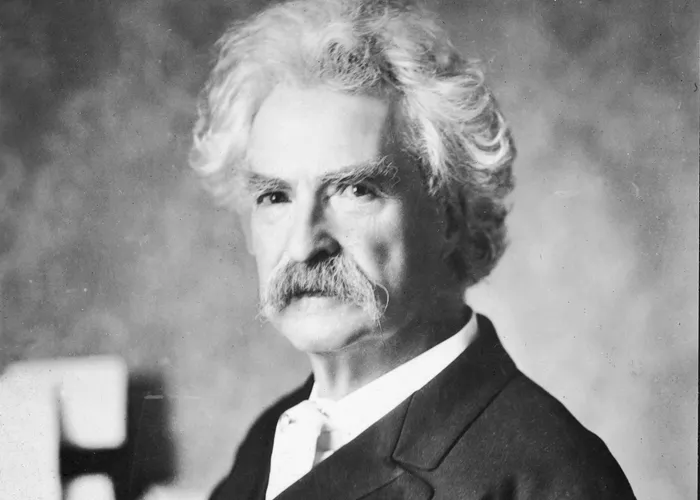The term “Gilded Age” refers to a period in American history during the late 19th century, characterized by rapid industrialization, economic growth, and significant social challenges. This evocative phrase was popularized by American author Mark Twain in collaboration with Charles Dudley Warner. Their 1873 novel, The Gilded Age: A Tale of Today, not only provided a satirical look at the era’s societal issues but also lent its name to this transformative period.
Mark Twain: The Man Behind the Term
Early Life and Career
Samuel Langhorne Clemens, known by his pen name Mark Twain, was born on November 30, 1835, in Florida, Missouri. Growing up along the Mississippi River, Twain developed a deep affection for the region, which later influenced much of his writing. Before embarking on his literary career, he worked as a riverboat pilot, gold prospector, and journalist, experiences that enriched his storytelling.
Literary Contributions
Twain’s literary works are renowned for their wit, humor, and keen observations of human nature. His most celebrated novels, The Adventures of Tom Sawyer and Adventures of Huckleberry Finn, offer vivid depictions of American society along the Mississippi River. Beyond novels, Twain penned numerous essays, short stories, and lectures, often addressing social injustices and human follies.
Charles Dudley Warner: Co-Author and Collaborator
Background
Charles Dudley Warner, born on September 12, 1829, in Plainfield, Massachusetts, was an esteemed essayist, novelist, and editor. Educated at Hamilton College, Warner initially pursued a career in law but soon transitioned to writing and editing. He gained prominence for his reflective essays and served as the editor of The Hartford Courant, where his collaboration with Twain began.
Literary Works
Warner’s literary portfolio includes works such as My Summer in a Garden (1870), a collection of humorous essays reflecting on gardening and life. His collaboration with Twain resulted in The Gilded Age: A Tale of Today, a novel that satirized the greed and political corruption prevalent in post-Civil War America. Warner’s contributions to literature also encompass essays and novels that delve into social and political themes.
The Birth of the “Gilded Age”
Origin of the Term
The phrase “Gilded Age” originates from the title of the 1873 novel co-authored by Twain and Warner. The term “gilded” refers to a thin layer of gold applied to a surface, symbolizing a superficially attractive appearance concealing underlying worthlessness. This metaphor aptly described the era’s facade of prosperity, which masked deep-seated social and economic issues.
Themes of the Novel
The Gilded Age: A Tale of Today presents a satirical portrayal of post-war American society. The novel follows the Hawkins family as they navigate the complexities of land speculation, political ambitions, and the pursuit of wealth. Through humor and irony, Twain and Warner expose the moral compromises and corrupt practices that accompanied the nation’s rapid industrialization.
Adoption of the Term
While the novel was not an immediate bestseller, its title resonated with critics and historians. By the 1920s, “Gilded Age” had become the accepted term to describe the late 19th-century period, highlighting the contrast between the era’s outward glamour and its underlying societal challenges.
Societal Context of the Gilded Age
Economic Expansion
The Gilded Age was marked by rapid economic growth, fueled by industrialization and technological advancements. Sectors such as steel, oil, and railroads saw unprecedented expansion, leading to the emergence of influential industrialists like John D. Rockefeller and Andrew Carnegie. This period also witnessed the rise of monopolies and trusts, concentrating wealth and power in the hands of a few.
Social Challenges
Beneath the veneer of prosperity lay significant social issues. The wealth gap between the affluent and the working class widened, with laborers enduring poor working conditions and low wages. Urbanization led to overcrowded cities, inadequate housing, and unsanitary living conditions. Political corruption was rampant, with business interests heavily influencing government policies.
Legacy of the Gilded Age
Influence on Literature
The Gilded Age left an indelible mark on American literature. Authors like Henry Adams and Frank Norris continued the tradition of social critique, addressing themes of corruption, inequality, and moral ambiguity. The era’s challenges inspired a literary movement that sought to expose societal flaws and advocate for reform.
Socio-Political Reforms
The disparities and injustices of the Gilded Age prompted significant socio-political reforms. Progressive movements emerged, advocating for labor rights, women’s suffrage, and antitrust legislation. These efforts led to substantial policy changes aimed at curbing corporate power and addressing social inequities.
Conclusion
Mark Twain and Charles Dudley Warner’s collaborative work, The Gilded Age: A Tale of Today, not only provided a satirical lens on post-Civil War American society but also bestowed the era with its defining name. Their insightful critique shed light on the complexities of a nation grappling with rapid industrialization, highlighting the contrasts between its outward affluence and underlying societal challenges. The legacy of their work continues to influence literary discourse and our understanding of this pivotal period in American history.

